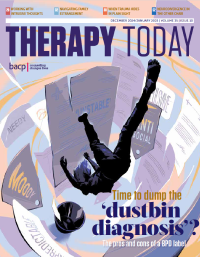If you’d have asked me 12 years ago what depression is, I wouldn’t have been able to answer. At that time I wasn’t aware of anyone in my immediate family who’d suffered from it. I’d grown up in a religion where it wasn’t mentioned, and ‘feeling down’ was assumed to be the result of committing a sin. The shaming and guilt that followed could only be dealt with by praying to God for forgiveness, repenting and working harder at spiritual studies.
But my marriage of 27 years had ended, leaving me feeling so very low that I had to move in with my parents. The effects of the break-up were made far worse because within my religion marriage is for life unless one partner has been unfaithful, which wasn’t the case. This meant an increased pressure to resolve and reconcile, and this, along with the shame and guilt of not having succeeded, was profoundly stressful. It left me incapacitated. I was a total mess. I didn’t understand what was happening inside my head and couldn’t work or care for myself. Getting out of bed every day was an immense battle. I needed the love and support of my mum and dad.
During these dark days I began to truly understand what it’s like to feel that a black hole is sucking you down and down – a vortex of power you feel you can’t fight against. I’d wait until my parents left the house and then howl at God, cry uncontrollably and bang my head against the wall. I spent my time planning how to bring this all to an end. Suicide seemed like the best way out – I wouldn’t be a burden to others any longer.
My brother understood and suggested I see my GP, which literally saved my life. I found getting a diagnosis of depression really helped – it put a name to my tormented thoughts. My GP gave me time and space to talk about what was happening, and she recommended a counsellor, a practitioner who was in his ‘third act’ having retired from the RAF and retrained. He provided sessions at a reduced cost or, if I couldn’t afford them, no cost at all. Without this kindness I wouldn’t have been able to carry on receiving the help I needed, and I will always be eternally grateful to him.
Having someone to talk openly to without judgment helped me understand why I was feeling the way I was. I started to use each week’s session as a time marker – I’d survived another week! We began to look at techniques to rebuild my self-esteem and manage the added crippling anxiety, so I could begin to see life on my own as a new start.
Eventually I returned to work, and then the pandemic hit just as I’d agreed to help out with the human resources manager’s role while the incumbent was on maternity leave. Very soon I realised that the mental and emotional toll of lockdowns on the workforce was acute. Many were not coping, some were contemplating ending their lives.
To try to make a difference, I embarked on an online course in mental health awareness and first aid. Not only did I love it, but it really made a difference to the way I was able to help my colleagues. Once the pandemic ended I enrolled on a Level 2 introduction to counselling skills course, and haven’t stopped since.
The positive experience with my first counsellor, and now my experiences with clients who are suffering with depression, anxiety and low selfesteem, provide the motivation I need to continue in this career. I hope it will become a lifelong way of saying thank you to all those who not only helped me change my life around but saved it. Whatever happens, I know that I’ll never pass up the opportunity to ask someone how they are and offer some help. Just like others did for me.

